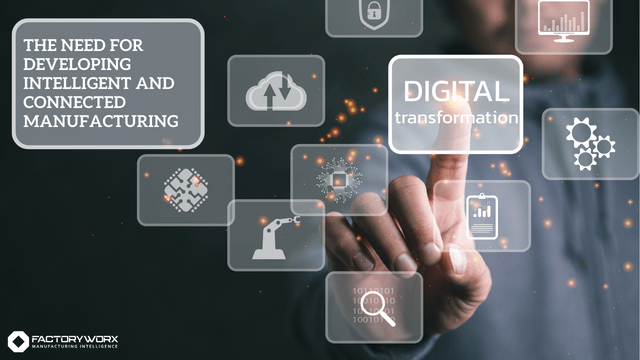
- November 22, 2022
- admin
- 0
Read Our Blog

Digital transformation: The Need for developing Intelligent and Connected Manufacturing
What are digital transformation trends in connected manufacturing?
There is a revolutionary shift in manufacturing factories like the Internet of Things, cloud computing, advanced analytics, and the latest industrial technologies. ERP and IoT are assisting manufacturers in transforming their operations.
Connected intelligent equipment and IT systems offer continuous insights, allowing manufacturing executives to make informed decisions with objective, up-to-date market information, handle inventory in real time, revise processes and boost innovations to meet demand.
Such hyper-connected channels of free-flowing data allow manufacturers to operate with shorter lead times, create a closer relationship between supply and demand, create new business models when opportunities and market demand arise, and accelerate the launch of new products on the market.
You no longer need to have a large organisation to benefit from these smart technologies. For instance, small, medium, and even large industrial units all employ paperless manufacturing software, and each has reaped significant benefits. The following are the most critical digital transformation trends in 2023.
5G and Smart Manufacturing
Over the past few years, 5G has been a trendy topic. But this year is important because 5G has finally made it into the manufacturing sector. The fourth industrial revolution, or Industry 4.0, is ushering in a time of connected, smart factories that can communicate with one another and make decentralised decisions. But without 5G, this change is impossible.
This fifth-generation mobile network can handle the full integration of the IIoT in a smart factory since it is faster and more powerful. 5 G's wireless flexibility, high capacity, and low-latency performance make it a default option to support manufacturers.
Agility and Responsiveness
The biggest benefit is that technology is allowing our manufacturers to focus on improving agility and responsiveness because of changing market conditions and customer demands.
This is advantageous to the manufacturing units. They will be able to precisely match production cycles and emerging product demand levels. The more successfully a manufacturer can match those two fundamentals, the more agility they can bring to their operations.
3D Printing Technology
In the manufacturing sector, 3D printing is a digital transformation technology that is frequently discussed among businesses. Utilising this technology enables businesses to produce prototypes more quickly and affordably. In fact, developments in this field have reduced costs by almost half while doubling performance.
It's an affordable method for product designers to troubleshoot and test their commodities. Additionally, it helps industrial producers in producing goods that are in great demand. The automotive and aerospace manufacturing units are already making good use of this technology.
What are the drivers for connected manufacturing?
The term "connected manufacturing" refers to the integration of operational technology (OT) and information technology (IT). It ensures that all of your processes, plants, products, and customers are well connected. This goes far beyond the application of digital technologies to a holistic manufacturing process.
We once imagined a digital factory with a robot-driven production floor, but today's reality has brought to life factory floors with the entire manufacturing ecosystem connecting processes, machines, data, employees and customers, which is far beyond what was once imagined.
No business wants to be left behind. Everyone wants to use connectivity to increase efficiency and discover new business opportunities, right? So, drivers of connected manufacturing are widely classified as follows:
- Operational efficiency is essential to gain time between failures and the time it takes to repair.
- Advancements in the supply chain to track assets and gain visibility more quickly.
- Improvement of customer experience.
- Innovation and new product development.
Major challenges in digital manufacturing
Resistance to change
It isn't only technology. Employees may be resistant to change at first, so firms must change their business culture to help ease the transition. Adopting a culture of continuous improvement and exploration can help, as well as emphasising the benefits of digitisation.
The initial investment capital
Small to medium-sized businesses may not have the funds to invest in new technologies or adapt existing ones. This can be a barrier for organisations looking to shift towards the digital era, but manufacturers must know to see the bigger picture.
There will be investment costs upfront, but what is the expense of not investing in technology to keep up with global movement? This necessitates a good investment strategy to assist manufacturers in determining how much to set aside, what advancements to make, and how to measure the results.
Security
As digitalisation becomes a growth factor and a global trend, an increasing amount of equipment is being connected via IoT. Human workers are gradually being replaced by robotics, AI, and autonomous machines are empowering administrative tasks- often unsupervised. Loads of data are generated as a result of all of this, so the security of all data - both professional and personal- has long been a major challenge as well as a growing concern.
Employees and management are both concerned about the security of personal data in the system. Any violation has the potential to result in significant losses or, worse, the failure of the entire business.
Final thoughts
SOverall, digital transformation in manufacturing can be beneficial. However, it only provides unique advantages, such as flexibility and cost-efficiency, only when the proper foundation for its application and a reliable software development partner is in place. FactoryWorx Industry 4.0 Solution allows businesses to leverage the connectivity of IIoT technologies, predictive analytics, and AI to accelerate innovation and productivity across the entire manufacturing process.

